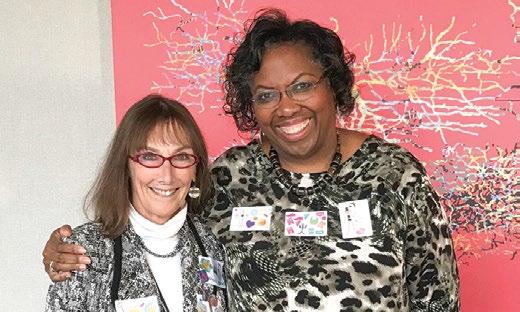
4 minute read
A History of Supporting Neurologists with Lifelong Learning Opportunities continued

Summer Conference: Emergency and Hospital Neurology offered this month in the AAN’s headquarters city of Minneapolis from July 28 to 29.
Technology Advances Expand Self-study Opportunities
While the pandemic wreaked havoc on the traditional formats for the 2020 Annual Meeting and Summer and Fall Conferences, the AAN drew upon its extensive and successful experiences with long distance/remote learning to deliver virtual education opportunities in several ways. Thanks to a grant from the American Board of Psychiatry and Neurology’s (ABPN), the 2019 Annual Meeting On Demand was made available for free to members as they faced restricted travel, work disruptions, and financial challenges.
Self-study has long been an important education component of the AAN since it mailed cassette tapes to members in the 1970s. The self-assessment publication Continuum: Lifelong Learning in Neurology ® was launched in 1993 by Munsat to help neurologists keep abreast of the latest clinical and from page 13 scientific developments. Subscribers now number more than 14,300 worldwide, and the AAN and publisher Wolters Kluwer provide the World Federation of Neurology with 400 copies of Continuum each year to distribute to program coordinators in various low- and low-to-mid-income countries.
The first Quintessentials® practice improvement tool, “Stroke Prevention for the Practicing Neurologist,” went online in 2000. Quintessentials allowed neurologists to compare their practices to evidence, expert opinion, and their colleagues and to stay current on treatment and practice trends.
The Internet and CD-ROM audio files were harnessed to deliver Annual Meeting educational programs via Annual Meeting On Demand and other selfassessment resources, such as NeuroSAE®, which debuted in 2007. NeuroLearn and Patient Safety Education was also made available. Many of these products were designed to help neurologists prepare for the ABPN-mandated continuing education or self-assessment components for maintenance of certification, now known as “continuing certification.” Due to members’ frustrations with the ABPN’s maintenance of certification requirements, the AAN responded on several levels, from advocating to ABPN for changes that would lessen the time burden on neurologists to developing a myriad of resources to assist members. MOC education resources were added as free benefit for members beginning in 2015. The Academy has continued to produce new education products, including NeuroBytes videos launched in 2019; NeuroPanels, launched in 2022; and NeuroReady ®
Practice management webinars were offered beginning in 2009 to help solo and small practice neurologists and business administrators understand the many changes in the health care environment, particularly with regard to coding and reimbursement as the Centers for Medicare & Medicaid Services rolled out new regulations.
The AAN's eLearning portfolio began to grow in 2010 forward with NeuroSAE, NeuroPI, and

NeuroLearn. In 2011, the Academy introduced Learning Across Your Lifetime to help members determine their continuing education requirements throughout their career, and to provide them with recommended AAN education resources to help them meet those needs, including webinars for practice managers and the APP Neurology Education Series for advanced professional practitioners.
The Academy continues to find unique ways to engage members and help them further their education, including the popular Neurology Question of the Day, which began in 2020.
Academy Prepares for Members for Leadership Roles
In 2002, the first Donald M. Palatucci Advocacy Leadership Forum was offered to members who sought to learn how to become an effective advocate for their patients and the field of neurology. Named to honor a late member of the Board of Directors who was passionate about grassroots advocacy, the Palatucci Forum has trained more than 560 graduates—including many international members.
The first Emerging Leaders Forum (now Program) class launched in 2013 was followed the next year by Diversity Leadership. Since then, the Academy has developed a wideranging Leadership Development Program that includes:
Director Mentorship Leadership Program
Diversity Leadership Program
Enhanced Resident Leadership Program
Emerging Leaders Program
Palatucci Advocacy Leadership Forum
Practice Leadership Program
Transforming Leaders Program
Women Leading in Neurology Program

These programs recognize leadership potential in AAN members and provide the tools to harness that potential and take it to the next level in their careers and communities. No other suite of programming in the country matches this caliber of leadership development that incorporates training, personalized coaching, and mentoring, tailored specifically for each leadership cohort. While many of these programs span months of learning and interaction with peers, the Academy also promotes development of skills through Leadership University, currently available at the Fall Conference and Annual Meeting.
“Viewing leadership as a learned skill that we practice and refine (as opposed to an intrinsic talent) makes leadership feel remarkably accessible to everyone,” said Thabele (Bay) Leslie-Mazwi, MD, member of the Transforming Leaders Program Class of 2019. “We are all leaders in our daily lives in some form. It might be within our families or friendship circles, within our divisions, within our departments, or at a larger regional or national level.”
Anti-racism Education Program
In 2021, the AAN was awarded a grant from the Health Equity Innovation Fund of Genentech and the Genentech Foundation to support groundbreaking solutions to promote health equity and diversity in STEM from kindergarten to career. One of 40 recipients, the Academy was the only neurology-focused organization chosen for the grant out of nearly 380 academic institutions, health systems, nonprofits, patient groups, think tanks and community organizations that applied. The resulting Anti-racism Education Program is an ondemand, self-paced anti-racism core curriculum unique for neurologists and designed to be completed over several months with built-in time for reflection. Four modules cover:
Setting the Stage: Reflections on Race, Identity, and Socialization
The History of Racism in Neurology: Member Experiences with Bias and Racism

Patient Care Stories: Vignettes in Clinical and Academic Neurology
Institutional Structures: Racism in Training and Anti-racism Leadership
Continued on page 16 ›








